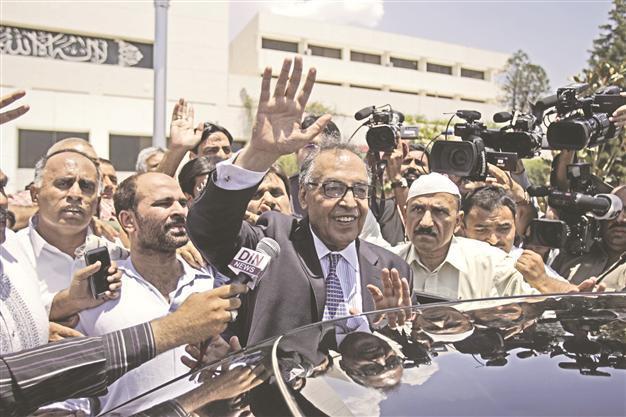Anti-narcotic court order deepens Pakistan crisis
ISLAMABAD

Makhdoom Shahabuddin, nominated prime minister by the ruling Pakistan People’s party, waves after filing his candidacy paper at the Parliament, in Islamabad. AP photo
Pakistan’s ruling party yesterday chose its candidate to replace the prime minister ousted by the Supreme Court, but the nominee was immediately hit with an arrest warrant linked to a drug importation scandal, in a sign that the political turmoil may continue for some time.Makhdoom Shahabuddin, the outgoing textile minister who is considered a Pakistan People’s Party (PPP) loyalist, filed his nomination papers at Parliament, ending speculation that the government was planning to defy the court’s June 19 ruling against ousted Prime Minister Yousuf Raza Gilani for contempt of court. The PPP’s coalition has a majority in the house. But in an indication that his nomination and premiership if elected by lawmakers may not be smooth, an anti-narcotics court judge in the northern city of Rawalpindi issued an arrest warrant for Shahabuddin, citing his alleged role in a scandal involving the import of a drug that can be used to make methamphetamine, officials said.
The PPP said that a “covering candidate” for the party, lawmaker Raja Pervaiz Ashraf, had also filed
papers, in the event that Shahabuddin was not elected. Horse trading, as well as the arrest warrant, could further complicate the process. Gilani was dismissed because he had refused to initiate a corruption case against President Asif Ali Zardari, the head of the PPP, in an escalation of the power struggle between the government and activist judges. PPP politicians quickly circulated Shahabuddin’s name as a replacement.
Future unknown
The next prime minister will likely also face the same order from the Supreme Court to investigate Zardari, meaning political instability seems likely to continue until the government’s term ends in March 2013. The Gilani government has been widely criticized for exacerbating or doing nothing to address the massive economic and security challenges in the country. The court has been accused of unfairly targeting the government.
It remains unclear whether the development could derail Shahabuddin’s nomination. Any arrest warrant may automatically be dropped if he became prime minister, as he has immunity from prosecution. Shahabuddin was health minister when the scandal broke, and Gilani’s son has also been linked to the case.
The accusations revolve around two Pakistani pharmaceutical companies that allegedly used political connections to obtain huge amounts of ephedrine in 2010. They are suspected of diverting it to figures in the drug trade who could have used it to make methamphetamines worth billions of dollars.
















